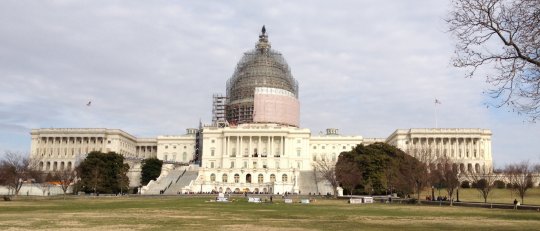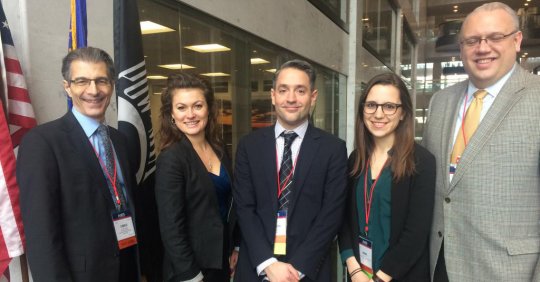
On Tuesday, March 24, thousands of arts supporters took to the hill to advocate for the arts during this year’s Arts Advocacy Day. Hosted by Americans for the Arts, this annual event brings hundreds of non-profits and civic organizations together to receive expert advice and to then take action by visiting their state congressional offices. Arts Advocacy Day was a big first step, but it only set the foundation for advocacy efforts and there is still more work to be done.
Young Audiences Arts for Learning (YA) is proud to be a cosponsor of Arts Advocacy Day and I was thrilled to attend and represent the national organization. Joining me from our affiliate network was Melissa Kate from Young Audiences of Western New York. On Monday, participants met at the Omni Shoreham Hotel and spent the morning learning about arts legislation and related action items. The legislative updates were reinforced by an inspiring keynote address by Jane Chu, Chairman of the National Endowment for the Arts. Arts educators will have another chance to hear her speak at the national arts-in-education conference in Kansas City this April. The afternoon consisted of several breakout panels that focused on arts policy issues. Highlights among them were Arts in Health, Arts & Technology: White Spaces & Net Neutrality, and Nonprofit Tax Issues.
The conference participants were then organized into their state delegation parties, where we discussed how we would approach each scheduled congressional meeting. After an eventful day packed with peer-to-peer sessions and interactive advocacy breakouts, we were treated to a lecture by Norman Lear at the Kennedy Center for the Performing Arts. Lear’s call to action spoke to how the arts will help us achieve the promise of equal opportunity and justice for all Americans. Read more about Lear’s lecture at The Hill.
Tuesday was the big day, where arts advocates first gathered for a kickoff event where Congress representatives Louise Slaughter, Suzanne Bonamici, Leonard Lance, John Lewis and Senator Udall addressed the power of the arts and how it impacts every facet of American life. Congressman Lewis gave an emotionally charged speech that described the historic march of civil rights activists, where he was severely injured by state troopers in Selma, Alabama in 1965. He related how the arts, especially music, were vital to the Civil Rights movement, stating: "Without music, the movement would have been like a bird without wings."

The New York Delegation inside the Russell Senate Building. (from left to right) Professor Carlo Lamagna, Senior Faculty NYU; Melissa Robinette, Eastern Regional VP of Actors Equity Association; Marcus Romero, YA; Anna Burden, Research Assistant at NYU; and Tod A. Kniazuk, Executive Director, Arts Services Initiative of Western NY.
After these powerful remarks, I met with my New York delegation and we continued our day with meetings with staff members from the New York Senate offices, who were receptive of our collective story and arts policy concerns. We discussed key action items like supporting an National Endowment for the Arts level of $155 million, tax reform and charitable giving, and the economic impact of the arts on local communities. My colleagues spoke eloquently about these topics, and I focused my talking points on the transformative power of arts-in-education.
In brief, our platform advocated that the arts should be an integral part of every student’s education. The arts should always be considered a core subject, especially in federal law. Congress should also appropriate $30 million to fund the Arts in Education Program at the D.O.E. This restored funding will help improve arts learning in high poverty schools. This includes Professional Development for Arts Educators (PDAE) grants where a decrease in funding would negatively impact multiyear initiatives. YA’s affiliate in New Orleans, Young Audiences of Louisiana, was recently awarded a grant to provide arts-in-education professional development to teachers in some of the poorest schools in Jefferson Parish. These grants improve student access to the arts in local communities around the country.
I would like to thank Americans for the Arts for hosting this fantastic event and providing many of the resources and research that makes our advocacy possible. But our work is not finished. I encourage all arts advocates to continue their efforts and their advocacy outreach throughout the year. Arts education is an essential component for our children; it fosters creativity which leads to innovation, a sought after skill by employers. And as Abraham Lincoln once said: “The philosophy of the school room in one generation will be the philosophy of government in the next”.
Contributed by Marcus Romero
Communications Manager, Young Audiences Arts for Learning

